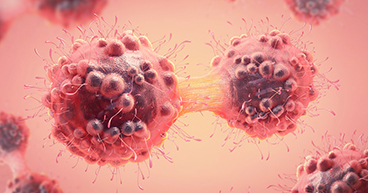
Cancer research saves lives.
That simple yet powerful statement is supported by these compelling facts: More than 15 million Americans are living with cancer, and 67 percent of them survive at least five years after diagnosis, according to National Cancer Institute estimates. And the American Cancer Society reports that, as the mortality rate from cancer has declined steadily for the past 26 years, close to 3 million cancer deaths have been avoided since 1991.
Behind these statistics are real people. Children whose life-threatening blood cancers have been treated thanks to innovative new therapies that enlist the body’s own immune system to fight the disease. Women who survived breast cancer because of therapeutic strategies that target the cancer’s dependency on hormones, starving it of the “fuel” it needs to grow. Men who are living with melanoma thanks to novel drug combinations that have transformed the management of this challenging malignancy.
Cancer research has fueled this progress, with even more promising breakthroughs on the near horizon. To get there, researchers rely on a steady stream of funding—from governmental agencies, private industry, foundations and generous individuals—to advance their discoveries from the laboratory to the patient, helping cancer patients survive and thrive. In the midst of the COVID-19 pandemic, with charitable giving declining across the board, supporting cancer research is even more important to making sure we don’t lose traction on discovering new and innovative treatments.
Private and nonprofit charitable organizations, such as Gateway for Cancer Research, deploy millions of dollars each year to accelerate the cancer research enterprise. They serve as stewards of evidence-based scientific research, applying rigor to the process of evaluating research proposals, and directing donor resources to support promising ones.
“Since its founding over 30 years ago, Gateway has raised more than $90 million for cancer research,” says Michael Burton, Gateway President and CEO. “Our focus is on healing patients today, while moving closer to conquering cancer tomorrow. We do this by funding research that is patient-centric and has the potential to transform how we treat this devasting disease.”
Cancer-related philanthropies run the gamut, from those that focus on specific cancers, to those that fund broad areas of research, to others that provide support services for cancer patients. Gateway for Cancer Research, for example, is the only nonprofit organization that focuses exclusively on Phase I and Phase II clinical trials—early-stage research that often serves as the proving grounds for innovative new approaches to cancer treatment.
With underwriting from Cancer Treatment Centers of America© (CTCA) and the family of CTCA Founder Richard J. Stephenson, Gateway has enrolled more than 6,000 patients in more than 180 clinical trials, including 52 active trials at leading cancer centers like Memorial Sloan Kettering, Dana Farber Cancer Institute, Johns Hopkins and St. Jude Children’s Research Hospital.
Making an impact
With so many cancer charities out there, what’s the best way to determine which groups deserve your contributions?
Do your research
Watchdog organizations and services, such as GuideStar, grade charities based on their history of compliance with laws and protocols governing those groups and how they spend their money. Gateway for Cancer Research, for example, is rated a gold-level charity by GuideStar, which monitors and reports the activities of nonprofits. Look for organizations that are highly rated.
What’s important to you?
Philanthropy is a personal choice, often driven by personal experiences.
Perhaps you or a family member has been diagnosed with breast cancer. Or maybe you understand the importance of funding early-stage clinical trials that are the source of new drug discoveries. You may choose to designate a specific cancer type or research area for your donation.
Where does the money go?
Look for charities that spend a small percentage of their funds on administrative costs, with the lion’s share going directly to research or patient services. Gateway, for example, spends 99 cents of every dollar on defraying costs for early-phase clinical trials.
“As careful stewards of our donors’ dollars, we hold our grantees accountable to desired outcomes and the patient enrollment required to advance the funded study,” Burton says. “Our grant agreements do not allow for overhead or administrative use of Gateway funds.”
Ease of giving
When you make a donation, you want the process to go smoothly. Gateway makes giving easy. For example, a page on its website offers donors various ways to give. Donors can opt for a one-time or recurring gift. And they can choose to direct the donation to a specific research program, or as a tribute to a loved one.
“Our donors share our commitment to patients and families touched by cancer,” Burton says, “and we’re dedicated to securing and managing their investments in a manner that ensures patients are the priority.”



